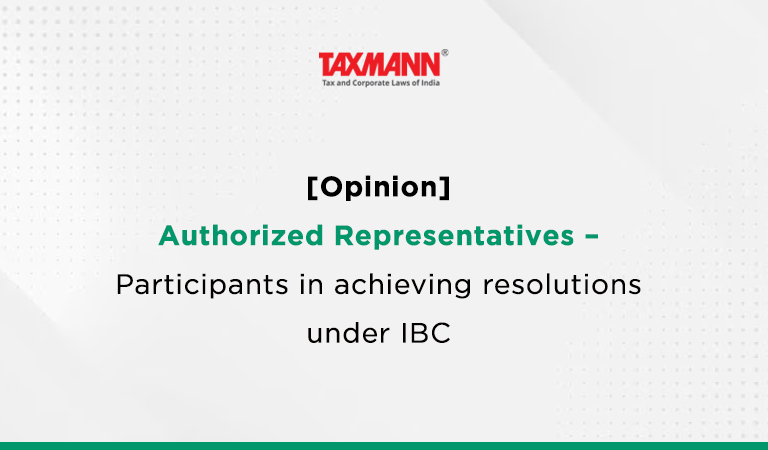
Yash Gupta – [2023] 147 taxmann.com 538 (Article)
Introduction
The Insolvency and Bankruptcy Code, 2016 (IBC) is a comprehensive legislation that aims to consolidate and amend the laws relating to reorganization and insolvency resolution of corporate entities, partnership firms, and individuals in a time-bound manner. One of the key features of the IBC is the provision for the appointment of authorized representatives (ARs) to represent the interests of various stakeholders in the insolvency resolution process.
Under the IBC, an authorized representative is a person who is authorized by the class of creditors to act on their behalf in the insolvency resolution process. The primary objective of appointing an AR is to ensure that the interests of the creditors are represented effectively in the resolution process, which can be complex and time-consuming.
The Insolvency and Bankruptcy Code of India (IBC) have made provisions for authorized representatives (AR) who play an essential role in the insolvency process for corporate entities. The IBC and its regulations clarify that the AR is a person who represents the financial creditors in the Committee of Creditors (CoC). According to the IBBI (Insolvency Process for Corporate Persons) Regulations of 2016, the interim resolution professional (IRP) is responsible for selecting the insolvency professional who has been chosen by the highest number of financial creditors in a given class to act as the authorized representative of the creditors of that class.
However, it is worth noting that the IBC and its regulations do not provide a specific definition of an authorized representative under the “definitions” section. The AR is described in various provisions and guidelines throughout the legislation, highlighting their crucial role in the decision-making process of the CoC. The AR represents the interests of financial creditors in the CoC, which is responsible for approving the resolution plan and other related matters in the insolvency resolution process.
Report of the Insolvency Law Committee (2018)
The Insolvency and Bankruptcy Code (IBC) aims to increase the participation of all members of the Committee of Creditors (CoC) in the decision-making process of meetings, but large CoCs can present significant logistical and technical challenges. The primary logistical challenge is issuing notices to a large number of individuals for the CoC meeting and securing a venue that can accommodate them, which can be a considerable logistical challenge and burden the resources of the corporate debtor.
Additionally, constructive decision-making can be difficult in a forum with too many participants with varying interests, and too many participants can significantly compromise the ability of the CoC to make effective decisions.
Technical challenges can also arise in large CoCs, particularly in registering a large number of voters on the e-voting portal and ensuring that each has access to it. Technical glitches can prevent some financial creditors from exercising their right to vote on the e-voting portal, leading to requests to record their votes through email. These challenges can disrupt the decision-making ability of the CoC and undermine the very objective of creditor participation as envisioned under the IBC.
The Committee tasked with reviewing the Insolvency and Bankruptcy Code (IBC) recognized the need for a mechanism that would mandate the representation of security holders, deposit holders, and all other classes of financial creditors that exceed a certain number, through an authorized representative. To achieve this, the Committee recommended the addition of a new provision to section 21 of the Code.
The Committee suggested that such a representative could be a trustee or agent appointed under the terms of the debt agreement of the creditors. Alternatively, an insolvency professional could be appointed by the National Company Law Tribunal (NCLT) for each class of financial creditors. The authorized representative would act and attend meetings on behalf of the respective class of financial creditors and would vote on behalf of each creditor to the extent of their voting share, following their instructions.
To ensure adequate representation by the authorized representative, a specific provision outlining their rights and duties should be inserted into the Code. Additionally, the Insolvency and Bankruptcy Board of India (IBBI) should specify the requisite threshold for the number of creditors and the manner of voting through regulations to facilitate efficient voting. The proposed mechanism for mandated representation of financial creditors through an authorized representative aims to ensure that the interests of all stakeholders are protected in the insolvency resolution process.
Therefore, in order to ensure the effective participation of representatives from different classes of creditors in the Corporate Insolvency Resolution Process (CIRP), a provision for the appointment of authorized representatives (ARs) has been introduced with Regulation 16A of Insolvency and Bankruptcy Board of India (Insolvency Resolution Process for Corporate Persons) Regulations, 2016. ARs enable the different classes of creditors to put forward their mandates and participate more effectively in the CIRP. This provision aims to enhance the inclusivity and transparency of the CIRP by allowing the ARs to represent the interests of their respective creditor classes at the Committee of Creditors (CoC) meetings.
Click Here To Read The Full Article
The post [Opinion] Authorized Representatives – Participants in achieving resolutions under IBC appeared first on Taxmann Blog.
